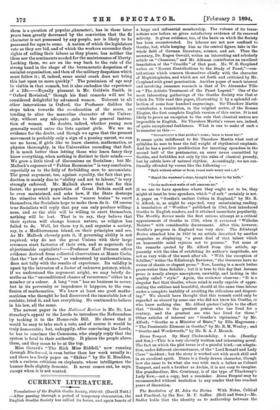CURRENT LITERATURE.
Translations of the English Goethe Society, 1891-92. (David Nutt.) —After passing through a period of temporary obscuration, the English Goethe Society has rallied its forces, and again boasts of
a large and influential membership. The volume of its trans- actions now before us gives satisfactory evidence of its renewed activity. It gives evidence, too, of the basis on which the Society has been reconstructed. Its labours are not now confined t,o Goethe, but, while keeping him as the central figure, take in the whole field of German literature, science, and art. Thus the secretary, Dr. Eugen Oswald, writes an interesting and scholarly article on " Chamisso," and Mr. Aikman contributes an excellent translation of the " Crucifix " of that poet. Mr. W. Cl. Coupland writes on "Recent Contributions to the Study of Faust,"—con- tributions which concern themselves chiefly with the character of Mephistopheles, and which are set forth and criticised by Mr. Co upland with great penetration. Another paper of much interest and involving immense research is that of Dr. Alexander Tine on "The Artistic Treatment of the Faust Legend." One of the most interesting gatherings of the Goethe Society was that at which Dr. Tille read this paper, illustrating it by a splendid col- lection of some four hundred engravings. Sir Theodore Martin contributes a translation, in the original metre, of the Roman Elegies, the first complete English version of this series. It is not likely to prove an exception to the rule that classical metres are impossible in English. Sir Theodore Martin's verses are, indeed, of quite exceptional feebleness. What is one to make of such a hexameter as this :—
" OPPORTUNITY is that goddess's name; learn to know her I" It seems quite indifferent to Sir Theodore Martin what sort of syllables he uses to bear the full weight of rhythmical emphasis. And he has a positive predilection for inserting spondees in the second half of the pentameter, an error never committed by Goethe, and forbidden not only by the rules of classical prosody, but by subtle laws of natural rhythm. Accordingly, we are con- tinually offended by verses like the following :— "Dark without colour or form, round BOWS weary and s-d."
"Stayed the wanderer's steps, brought him here to thy halls,' • "In the mellowest wafts of soft amorous air."
If we are to have spondees where they ought not to be, they might at least be true spondees, which "of soft" certainly is not. A paper on " Goethe's earliest Critics in England," by Mr. R. G. Alford, is, as might be expected, very entertaining reading.. A translation of " Wertber " published in 1780, first introduced Goethe to English readers, and it attained immediate popularity. The Monthly Review made the first serious attempt at a critical appraisement of Goethe in 1798, when it reviewed "Wilhelm Meister" with considerable discernment. After this, however, Goethe's progress in England was very slow. The Edinburgh Review attacked him in 1816 in an article described by another magazine as displaying "a great deal of that talent which an honourable mind rejoices not to possess." Yet some of the remarks quoted by Mr. Alford from this article, ap- parently with the idea of exhibiting its author's ineptitude, are not so very wide of the mark after all. "With the exception of Schiller," writes the Edinburgh Reviewer, "the Germans have no writer of chaste or elegant prose." Now, Lessing is a much better prose-writer than Schiller ; but it is true to this day that 3erman prose is nearly always amorphous, unwieldy, and lacking in the quality called "style." Again, the reviewer observes : "It is a singular fact that Goethe, whose mind is really capable of appre- ciating the sublime and beautiful, should at the same time labour under a complete inability of avoiding the ridiculous and disgust- ing." We should have thought that this remark could only be regarded as absurd by some one who did not know his Goethe, or who knew nothing else. Mr. Alford quotes Carlyle to the effect that "Goethe is the greatest genius who has lived for a century, and the greatest ass who has lived for three?' Other articles of interest are " Goethe's Optimism," by Mr. Alford; "Goethe as a Minister of State," by Ella Hagemann ; "The Pessimistic Element in Goethe," by Mr. R. M. Wenley ; and "Goethe and Wordsworth," by Mr. R. A. J. Meusch.


































 Previous page
Previous page